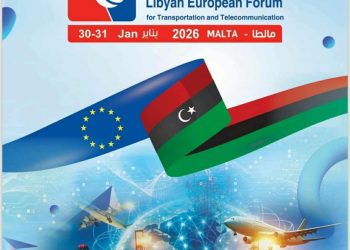Tripoli based Libyan Prime Minister, Abd Alhamid Aldabaiba, said Libya today is facing major internal and external economic challenges that we cannot and will not ignore.
Aldabaiba was speaking yesterday at the inauguration of the Libyan Economic Forum, organized by the National Economic and Social Development Board (NESDB), under the slogan “Libya: A promising future”.
Parallel unapproved spending outside budget creating a public debt
He said we cannot ignore parallel spending outside the budget (by the Eastern based Libyan government) and the resulting public debt, which is a debt that has not been approved and without supervision by any state institution except the Central Bank of Libya (CBL).
Aldabaiba said amounts came out of the CBL without real control or legal basis, so who holds accountable those who spent them outside the law, he asked.
Happy to be accountable before the Audit Bureau and Attorney General
He said his government has not disbursed any amount without the supervision of the oversight authority (the Audit Bureau), indicating that any infringements that occur in his government occur in all countries. He invited everyone to refer any infringements they discover to refer them to the Audit Bureau and Attorney General’s Office.
The public debt is a debt paid from the pockets of Libyans
The public debt is a debt paid from the pockets of Libyans, he added, not from the pocket of anyone else, through raising the exchange rate of the dollar, which is the basic constituent in the Libyan economy, and through imposing harsh (FX sales) fees, that have caused the erosion of purchasing power.
Public debt affects citizens at the heart of their daily lives, he added, although wages are fixed on paper, but in reality, they are being eroded in silence.
He said what is happening today is not a rise in prices, but rather a decline in the value of the Libyan dinar due to non-transparent monetary policies.
Real economic war being waged on the structure of the Libyan state
The PM said we are talking about the most dangerous tools of tampering with the Libyan economy and that there is a real economic war being waged on the structure of the Libyan state which weakens its institutions and empties its legitimate tools of their content.
Libya is not isolated from the world
He said Libya is not isolated from the world, as it is clearly and directly affected by international developments, including low oil prices, where oil export revenues constitute about 95 percent of state revenues.
Aldabaiba said conflicts in neighbouring countries are exacerbating pressure on the Libyan state, both economically and security-wise.
Libya had highest GDP in Arab world
He saidthe International Monetary Fund announced that Libya recorded the highest GDP growth rate in the Arab world, at 12%. At the same time, the inflation rate was around 2.5%, one of the lowest levels in the region.
Oil production has increased despite challenges
Thanks to great efforts, oil production increased from 1.1 million barrels per day to 1.4 million barrels per day, which is a positive indicator of improved economic performance despite the challenges.
Hard currency reserves up
Aldabaiba announced that despite the declared fiscal deficit by the Central Bank, the deficit did not affect hard currency reserves much, and stabilised between US$ 84 and US$ 94 billion, compared to US$ 79 billion in 2021.
Need a unified vision
This is not a political division, but rather a real battle between those who want to build the state and those who benefit from its absence. What we need is a national agreement on a unified development vision and strict oversight of public funds, he concluded.
The Prime Minister stressed that the Libyan Economic Forum represents a milestone in the path of economic reform in Libya, stressing that the challenges facing the country represent an opportunity to reorganize and move towards a transparent and orderly economy.
Adopting the National Strategies for Economic Reform and Development
During the forum’s activities, Aldabaiba adopted the National Strategies for Economic Reform and Development, stressing the government’s full commitment to implementing the outcomes of the forum, and launching a unified national economic program, implemented under the supervision of state institutions, and with the active participation of the private sector and civil society, in a way that ensures enhancing production, encouraging investment, achieving financial stability, and protecting public funds.
The event was inaugurated in the presence of the President of the High Council of State, Mohamed Tekala, the President of the Audit Bureau, Khaled Shakshak, the Minister of Transport and Financial Advisor to the Prime Minister, Mohamed Al-Shahoubi, along with several government ministers and Libyan businessmen.








